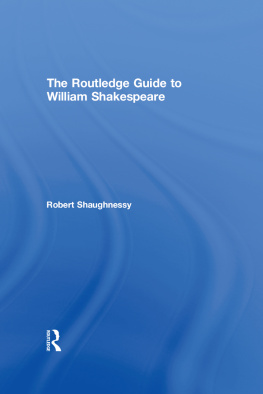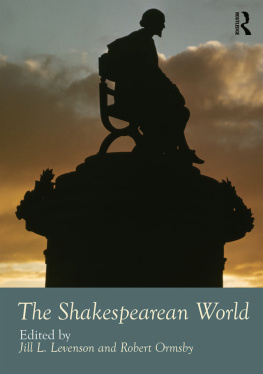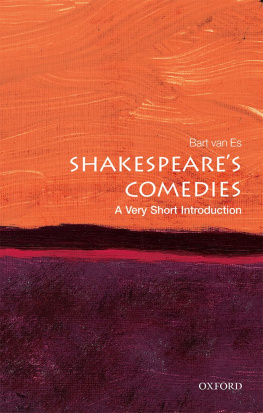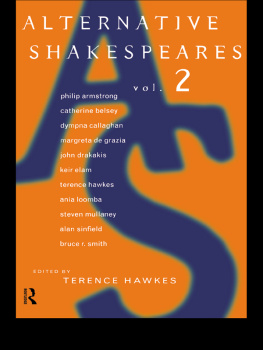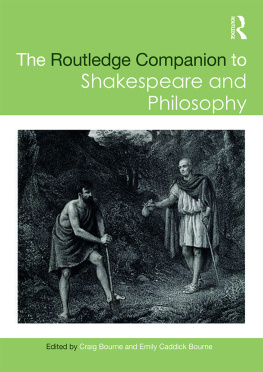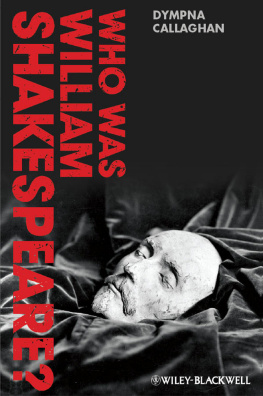The Routledge Guide to William Shakespeare
William Shakespeare is one of the most widely studied and culturally significant writers of all time, and his language and thought remain interwoven through popular reference and imaginings of the Western canon.
In this concise, structured guide, Robert Shaughnessy:
- introduces Shakespeare's life and works in context, providing crucial historical background
- introduces each of Shakespeare's plays in turn, considering issues of historical context, contemporary criticism and performance history
- provides a detailed discussion of twentieth century Shakespearean criticism, exploring the theories, debates and discoveries that have shaped our understanding of Shakespeare today
- looks at contemporary performance of Shakespeare on stage and screen
- cross-references between sections of the guide to suggest links between texts, contexts and criticism
- provides further reading by play and detailed chronologies.
Demystifying and contextualising Shakespeare for the twenty-first century, this book offers both an introduction to the subject for beginning students and an invaluable resource for more experienced Shakespeareans.
Robert Shaughnessy is Professor of Theatre at the University of Kent.
The Routledge Guide to William Shakespeare
Robert Shaughnessy

First edition published 2011 by Routledge
2 Park Square, Milton Park, Abingdon, OX14 4RN
Simultaneously published in the USA and Canada
by Routledge
711 Third Avenue, New York, NY 10017
Routledge is an imprint of the Taylor & Francis Group, an informa business
2011 Robert Shaughnessy
The right of Robert Shaughnessy to be identified as author of this work has been asserted by him in accordance with sections 77 and 78 of the Copyright, Designs and Patents Act 1988.
Typeset in Minion and Helvetica by Taylor & Francis Books
All rights reserved. No part of this book may be reprinted or reproduced or utilised in any form or by any electronic, mechanical, or other means, now known or hereafter invented, including photocopying and recording, or in any information storage or retrieval system, without permission in writing from the publishers.
British Library Cataloguing in Publication Data
A catalogue record for this book is available from the British Library
Library of Congress Cataloging in Publication Data
Shaughnessy, Robert.
The Routledge guide to Shakespeare / Robert Shaughnessy. 1st ed.
p. cm.
Includes bibliographical references and index.
1. Shakespeare, William, 1564-1616Criticism and interpretationHandbooks, manuals, etc.
I. Title.
PR2976.S3445 2010
822.33dc22
2010024259
ISBN 13: 978-0-415-27539-2 (hbk)
ISBN 13: 978-0-415-27540-8 (pbk)
ISBN 13: 978-0-203-83523-4 (ebk)
For Nicki
Contents
Acknowledgements
This book has taken a long time to complete, and along the way I have had much cause to be grateful to family, friends and colleagues for support, encouragement and advice. For initiating the project and seeing it through the first stages, my thanks to Liz Thompson and to the series editors of the Routledge Guides to Literature, Richard Bradford and Jan Jedrzejewski. Among the many colleagues whose generosity, shared insights, and sometimes indirect but nonetheless much-valued help have helped to make this book what it is, I thank in particular Pascale Aebischer, John Russell Brown, Mark Burnett, Peter Holland, Barbara Hodgdon, Graham Holderness, Kate McLuskie, Carol Rutter, Bill Worthen and Ramona Wray. Colleagues at Roehampton University and the University of Kent provided sympathetic ears and critical companionship: Chris Baugh, Peter Boenisch, Michael Dobson, Darryll Grantley, Susanne Greenhalgh, Patrice Pavis, Alan Read, and Melissa Trimingham; special thanks to Peter Reynolds (who secured this book's first period of leave) and Paul Allain (who enabled its second). I am grateful to the Arts and Humanities Research Council for the award of a further term of research leave. My thanks to the two anonymous reviewers of my leave application, for showing the difference between a hawk and a handsaw.
At Routledge, it has been a pleasure to work with Polly Dodson and especially with Emma Nugent, who has been both immensely supportive and extraordinarily patient, especially in the final stages. Lisa Williams's sharp-eyed and imaginative copy-editing saved me from my errors and untied knots; Andrew Watts calmly steered the book through to publication.
My family have lived with this book for as long as I have, and it has been both their amused refusal to take matters Shakespearean too seriously, and their ability to see through to what really matters, that has kept in view a world elsewhere. For this, and much else, I thank Caitlin, Nathaniel, Gabriel and Erina. My deepest thanks to Nicki, who has travelled through it with me, and who knows what is truly beyond words. This is all for you.
Preface
This book is for anyone, from undergraduate level upwards, who is interested in the works of William Shakespeare, in the stage and screen versions which these have generated and inspired, and in the critical debates that have been provoked by them, with a particular, though not exclusive, emphasis upon the work of the past three decades. Offered as a comprehensive single-volume resource, it combines a biography of Shakespeare as a professional poet and playwright, seen in the context of his theatre, and of the cultural, social and political worlds in which the works took shape, a concise account of every work in the canon, and a summary and overview of modern criticism, performance and film. During the past quarter-century, the field of Shakespeare studies has been one of rapid change, diversification and often fierce debate; the aim of this guide is to indicate to readers how to engage further with the most provocative, stimulating and illuminating criticism that has been produced during this exciting period of literary history, and also to reflect upon its future, perhaps even to contribute to it. At the same time, whilst recognising the legitimate and desirable predominance of the new, the contemporary and the innovative in today's critical reading lists, the guide also aims to position recent and current movements in the context of what came before them, not only to establish their place in the larger historical landscape but also to remind its users that not everything that was published on Shakespeare prior to the last quarter-century has been superseded or discredited (far from it). There are, of course, some areas in which a broad and, for the time being, seemingly solid consensus appears to have been reached. For most readers of this book, performance and, increasingly, performance on screen and online is the primary, and seemingly natural, medium in which Shakespeare's words and works are encountered and brought to life; in this respect, there is nothing out of the ordinary in this book's use of theatre and performance, actual and imagined, as a key point of reference for the plays. However, since this book aims not only to record and reinforce consensus but, where necessary, to interrogate it, it also highlights the real and growing differences within the discipline of Shakespeare performance studies, particularly as it has begun to register the implications of the new thinking about theatre and performance that has been taking place beyond the Shakespearean critical industry.

